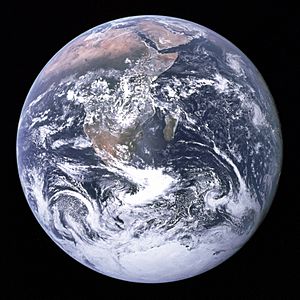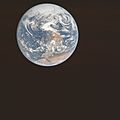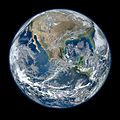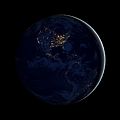The Blue Marble facts for kids
The Blue Marble is a famous photograph of our planet, Earth. It was taken on December 2, 1972, by the brave crew of the Apollo 17 spacecraft. At that moment, they were on their way to the Moon, about 18,000 miles (29,000 kilometers) away from Earth. This picture is one of the most well-known images in all of human history! It shows our home planet as a beautiful, swirling blue and white marble in space.
Contents
What is The Blue Marble?
The name "Blue Marble" comes from how Earth looks in the photo. It appears like a shiny, colorful marble floating in the dark. This image was the first clear picture of a fully lit Earth. It showed the North Pole at the top and the South Pole at the bottom. This view was new and exciting for people on Earth.
Who Took the Photo?
The Apollo 17 mission was the last time humans traveled to the Moon. The crew members were Eugene Cernan, Ronald Evans, and Harrison Schmitt. They took the picture using a 70-millimeter camera. It was taken about five hours after they launched from Earth. The Sun was behind them, making Earth fully lit up.
Why is it So Famous?
The Blue Marble photo became very popular very quickly. It showed people how beautiful and fragile our planet is. It helped many people think about protecting the environment. The image also reminded everyone that we all share one home in space. It has been used in many books, movies, and posters.
Other Views of Earth
Since 1972, many other amazing pictures of Earth have been taken. Satellites and other spacecraft continue to send back new images. These pictures help scientists study our planet. They also remind us of Earth's incredible beauty.
Related pages
- Earth phase
- Extraterrestrial sky
- Pale Orange Dot (Early Earth)
- Spaceship Earth
Images for kids
-
Black Marble – North and South America at night. You can see Hurricane Sandy off the coast of Florida.
-
The Moon moving in front of Earth in July 2016, seen by the DSCOVR satellite. The far side of the Moon faces the camera.
See also
 In Spanish: La canica azul para niños
In Spanish: La canica azul para niños
 | Aaron Henry |
 | T. R. M. Howard |
 | Jesse Jackson |






